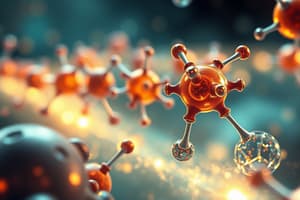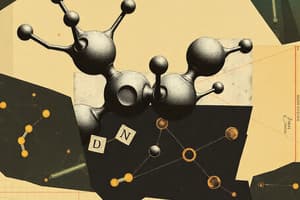Podcast
Questions and Answers
Quelle est la fonction principale de la respiration cellulaire?
Quelle est la fonction principale de la respiration cellulaire?
- Décomposer le glucose pour produire de l'ATP (correct)
- Réguler les processus cellulaires par des hormones
- Produire des protéines à partir d'acides aminés
- Créer l'ADN à partir de l'ARN
Qu'est-ce qui n'est pas un exemple de stratégie de régulation des processus biochimiques?
Qu'est-ce qui n'est pas un exemple de stratégie de régulation des processus biochimiques?
- Modification covalente
- Régulation allostérique
- Rétroaction positive
- Thérapie génique (correct)
Quel processus est impliqué dans la création des protéines?
Quel processus est impliqué dans la création des protéines?
- Photosynthèse et respiration
- Dégradation des lipides
- Rétroaction feedback
- Transcription et traduction (correct)
Quel domaine ne bénéficie pas de la biologie chimique?
Quel domaine ne bénéficie pas de la biologie chimique?
Lequel des éléments suivants est un rôle des hormones dans le métabolisme?
Lequel des éléments suivants est un rôle des hormones dans le métabolisme?
Quel rôle principal jouent les enzymes dans les réactions biochimiques?
Quel rôle principal jouent les enzymes dans les réactions biochimiques?
Quel est le principal rôle des lipides dans les organismes vivants?
Quel est le principal rôle des lipides dans les organismes vivants?
Quel type de molécule est le glucose?
Quel type de molécule est le glucose?
Quelle voie métabolique se concentre sur la conversion de l'énergie lumineuse en énergie chimique?
Quelle voie métabolique se concentre sur la conversion de l'énergie lumineuse en énergie chimique?
Quel élément est essentiel à la structure des acides nucléiques?
Quel élément est essentiel à la structure des acides nucléiques?
Quelle fonction est associée aux protéines enzymes?
Quelle fonction est associée aux protéines enzymes?
Quel processus est conjugé à la catabolisme?
Quel processus est conjugé à la catabolisme?
Quel est le produit final de la glycolyse?
Quel est le produit final de la glycolyse?
Flashcards
Spécificité enzymatique
Spécificité enzymatique
Capacité d'une enzyme à catalyser une réaction ou un groupe de réactions spécifiques.
Respiration cellulaire
Respiration cellulaire
Dégradation du glucose pour produire de l'ATP, la source d'énergie des cellules.
Synthèse protéique
Synthèse protéique
Création de protéines à partir d'acides aminés selon l'information génétique de l'ADN.
Transcription
Transcription
Signup and view all the flashcards
Traduction
Traduction
Signup and view all the flashcards
Homéostasie
Homéostasie
Signup and view all the flashcards
Régulation biochimique
Régulation biochimique
Signup and view all the flashcards
Mécanismes de régulation
Mécanismes de régulation
Signup and view all the flashcards
Biochimie
Biochimie
Signup and view all the flashcards
Biochimie
Biochimie
Signup and view all the flashcards
Macromolécules biologiques
Macromolécules biologiques
Signup and view all the flashcards
Protéines
Protéines
Signup and view all the flashcards
Glucides
Glucides
Signup and view all the flashcards
Lipides
Lipides
Signup and view all the flashcards
Acides nucléiques
Acides nucléiques
Signup and view all the flashcards
Voies métaboliques
Voies métaboliques
Signup and view all the flashcards
Catabolisme
Catabolisme
Signup and view all the flashcards
Anabolisme
Anabolisme
Signup and view all the flashcards
Respiration cellulaire
Respiration cellulaire
Signup and view all the flashcards
Photosynthèse
Photosynthèse
Signup and view all the flashcards
Enzymes
Enzymes
Signup and view all the flashcards
Study Notes
Introduction to Biochemistry
- Biochemistry is the study of the chemical processes within and relating to living organisms.
- It encompasses a wide range of topics, including the structure and function of biological molecules, metabolic pathways, and the regulation of these processes.
- It's a fundamental science that underpins many fields of biology, medicine, and biotechnology.
- Key areas of focus include the structure, function, and interactions of biological macromolecules like proteins, carbohydrates, lipids, and nucleic acids.
Biological Molecules
- Proteins: Complex polymers of amino acids, crucial for diverse functions including catalysis (enzymes), transport, structure, and defense.
- Amino acid structure and properties are critical to protein function.
- Protein folding determines its 3-D structure and function.
- Carbohydrates: Organic compounds composed of carbon, hydrogen, and oxygen; serve as the primary source of energy and structural components.
- Simple sugars (monosaccharides) form the building blocks, which polymerize into complex carbohydrates (disaccharides, polysaccharides).
- Examples include glucose, fructose, and starch.
- Lipids: Diverse hydrophobic molecules, crucial for energy storage, membrane structure, and hormone production.
- Types include fats, phospholipids, and steroids.
- Nucleic Acids: Deoxyribonucleic acid (DNA) and ribonucleic acid (RNA) store and transmit genetic information.
- DNA carries the hereditary information.
- RNA plays a role in protein synthesis and other cellular processes.
Metabolic Pathways
- Metabolic pathways are a series of interconnected reactions that synthesize or break down molecules.
- Catabolism breaks down complex molecules for energy.
- Anabolism builds complex molecules from simpler ones.
- Cellular Respiration: A key catabolic pathway that extracts energy from glucose to produce ATP, the primary energy currency of cells.
- Includes glycolysis, Krebs cycle, and oxidative phosphorylation.
- Photosynthesis: A key anabolic pathway that converts light energy into chemical energy stored in glucose.
- Occurs in chloroplasts.
Enzymes
- Enzymes are biological catalysts that accelerate biochemical reactions without being consumed in the process.
- They function by lowering the activation energy needed for a reaction to occur.
- Enzyme activity is affected by factors like temperature, pH, and substrate concentration.
- Enzyme specificity relates to the ability of an enzyme to catalyze a particular reaction or group of reactions.
Cellular Processes
- Cellular respiration: Breakdown of glucose to produce ATP, the energy source for most cellular activities.
- Occurs in different stages, each facilitated by specific enzymes and reactions.
- Protein synthesis: Creation of proteins from amino acids according to the genetic information encoded in DNA.
- Involves transcription (DNA to RNA) and translation (RNA to protein).
Regulation of Biochemical Processes
- Cellular processes are tightly regulated to maintain homeostasis.
- Feedback mechanisms, allosteric regulation, and covalent modification are examples of regulatory strategies.
- Hormones and other signaling molecules play a role in coordinating metabolic processes.
- Regulation can ensure suitable energy generation and utilization, and that cellular components are effectively synthesized and maintained.
Importance of Biochemistry
- Understanding the biochemical processes enhances our knowledge of fundamental life processes, leading to advancements in many fields.
- It helps develop new drugs and treatments for diseases like cancer, diabetes, and cardiovascular disease.
- Biochemistry is useful in areas like agriculture (increasing crop yields), biotechnology (producing biofuels), and environmental science (studying biodegradation).
- It also has applications in forensic science and food technology.
Studying That Suits You
Use AI to generate personalized quizzes and flashcards to suit your learning preferences.




